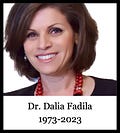Israel tragically lost a brave, creative Israeli-Arab educator on Friday, when Dr. Dalia Fadila drowned off the Herzliya beach. When we ran our podcast with Dalia almost two years ago, listeners were deeply moved. Many readers and listeners have joined us since then, so today, we are re-running that interview, providing access to everyone.
This is the text that accompanied our interview with Dr. Fadila almost two years ago:
To be in a conversation with Dr. Dalia Fadila is to be challenged, inspired and moved. Fadila, an Israeli Arab educator, sat with us to talk about her new project—the latest in a lifetime of extraordinary projects—called Atidna.
Listen carefully to Fadila, and here’s what you’ll hear. Unlike many Arab-Israeli leaders, she is not calling for a “state of all its citizens,” ie, a non-Jewish, ethnic-neutral democracy. She understands that Israel is a Jewish state, and believes that Arabs in Israel can have an extraordinary future. Unlike others, including a few whom we’ve interviewed in this podcast series, Fadila refers to herself as an Israeli-Arab, not a Palestinian Israeli, a term many others prefer, and she explains why.
In a recent profile in Forbes Magazine in which she was featured, Forbes had this to say.
Many people are working to improve life for the Arab citizens of Israel and advance Arab society. One of them is Fadila — an Arab Israeli of Palestinian heritage, a mother, founder of her own set of schools, and the first female dean of an Islamic college in Israel.
At least ten generations of Fadila's family lived in Tira, part of the "Arab triangle." After Israel became a country in 1948, her family stayed, and Tira became an Arab Israeli town.
"My father and my mother never told us stories of anger and loss. Instead, they told us stories of change and growth," Fadila said, "They told us stories of Tira changing over the last 70 years from a small farmer's village into a city."
Fadila said her family and her husband's family, who are also from Tira and stayed post-1948, focused on preserving and remaining on their land and in their homes — which they were allowed to do. Soon after the country was established, Fadila said her family enjoyed what she calls the benefits of being part of Israel that included social security, national security, social insurance, and economic stability.
"It led the Arab community inside Israel from a place of struggle, from trying to survive daily under the British Mandate and from being fearful for what you have, because, during the 30s, they lived in a state of chaos. But after the establishment of Israel, especially towards the 70s and 80s, the Arab community in Israel started to enjoy the privileges. They enjoyed the advantages of becoming a citizen of the State of Israel," Fadila said.
"No place is perfect, and no state around the world is perfect. And even the U.S., which is the torch of freedom and democracy, had its hard times, to put it as an understatement. But there has definitely been growth here for the Arab community."
Impossible Takes Longer is now available on Amazon and Barnes & Noble and at other booksellers.
Music credits: Medieval poem by Rabbi Shlomo Ibn Gvirol. Melody and performance by Shaked Jehuda and Eyal Gesundheit. Production by Eyal Gesundheit. To view a video of their performance, see this YouTube:
Our twitter feed is here; feel free to join there, too.
Our Threads feed is danielgordis. We’ll start to use it more shortly.




















In Memoriam - Dalia Fadila (1973-2023)